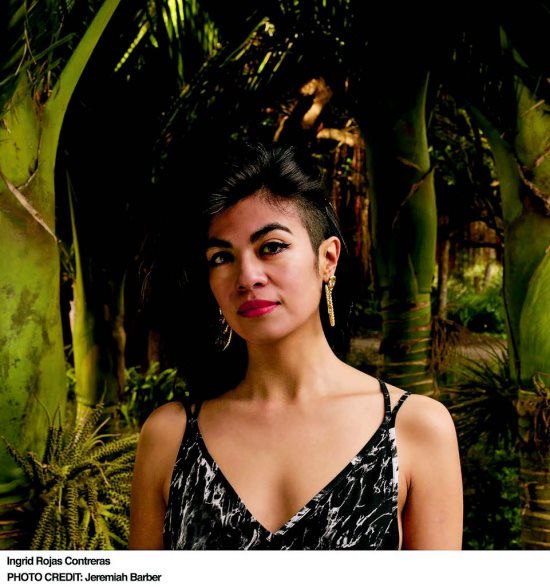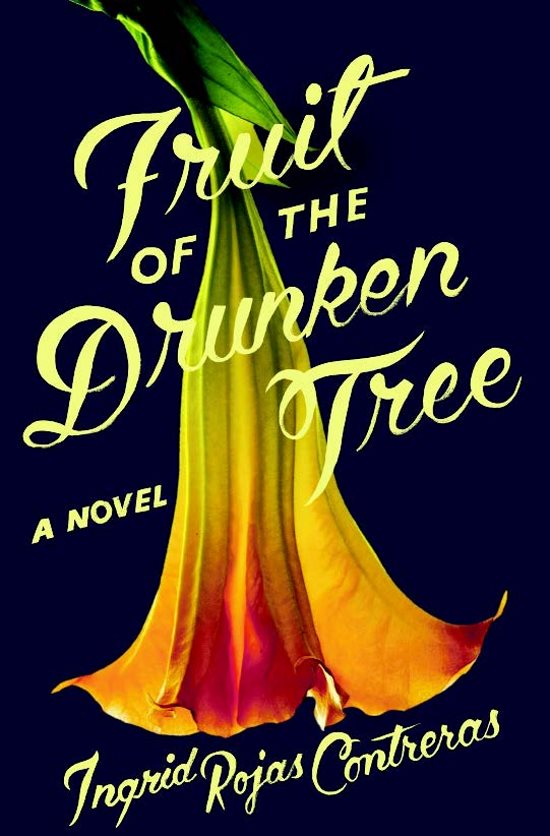|
|
Published January, 9th 2019
|
LLLC Sweet Thursday event features local author, activist
|
|
| By Lou Fancher |
 |
| Ingrid Rojas Contreras Photo Jeremiah Barber |
Consider it progress if a half-constructed small-scale castle or unfinished hand knit project linger indefinitely in the closet of San Francisco-based writer Ingrid Rojas Contreras. When the Colombian-born writer's image-filled, poetic prose is blocked, she flexes her creative muscles by building realistic model replicas of iconic architecture like Shakespeare's Globe Theatre or knitting a first-time-ever blanket. But sidewinding activities are abandoned the moment words resume their customary flow. Channeling her energy into short stories, articles, essays and books like the debut novel, "Fruit of the Drunken Tree," published in 2018, Contreras returns to what she describes as "my obsessive writing process."
 Contreras will appear Jan. 17 in conversation with moderator Jeffrey Dieden at Sweet Thursday Presents, supported by the Friends of the Lafayette Library. A brief Q&A with the audience and book signing will follow the one-hour presentation.
Contreras will appear Jan. 17 in conversation with moderator Jeffrey Dieden at Sweet Thursday Presents, supported by the Friends of the Lafayette Library. A brief Q&A with the audience and book signing will follow the one-hour presentation.
 "Fruit of the Drunken Tree" chronicles parallel stories of 7-year-old Chula and Petrona, the teenage girl hired by Chula's family to care for Chula and her older sister. Set largely in Colombia during the violent reign of Pablo Escobar, the swift-moving coming-of-age story is imbued with deep research, real life history, Contreras' personal experiences and an overall quality of raw suspense. Guerrilla armies, corrupt governments, bombings and betrayals provide a larger backdrop for the inter- and intra-family conflicts that drive the novel's compelling narrative.
"Fruit of the Drunken Tree" chronicles parallel stories of 7-year-old Chula and Petrona, the teenage girl hired by Chula's family to care for Chula and her older sister. Set largely in Colombia during the violent reign of Pablo Escobar, the swift-moving coming-of-age story is imbued with deep research, real life history, Contreras' personal experiences and an overall quality of raw suspense. Guerrilla armies, corrupt governments, bombings and betrayals provide a larger backdrop for the inter- and intra-family conflicts that drive the novel's compelling narrative.
 Contreras holds an MFA from Columbia College Chicago and is the 2014 recipient of the Mary Tanenbaum Literary Award in Nonfiction. Her writing has been anthologized in The Los Angeles Review of Books, Guernica and Electric Literature, among others. She is temporarily on hiatus from her position as NPR affiliate at KQED and teaches fiction at the University of San Francisco.
Contreras holds an MFA from Columbia College Chicago and is the 2014 recipient of the Mary Tanenbaum Literary Award in Nonfiction. Her writing has been anthologized in The Los Angeles Review of Books, Guernica and Electric Literature, among others. She is temporarily on hiatus from her position as NPR affiliate at KQED and teaches fiction at the University of San Francisco.
 Contreras says reactions to the book have erased fear. "What is most surprising is how the Colombia population in diaspora has reacted. My fear was there'd be anger. Instead, I've heard from Colombians born here in America that they gained a sense of what their parents wouldn't talk about: the family they lost in the 1980s and `90s because of the violence. What happened to cause (their parents) to uproot themselves and flee their homeland? Parents wouldn't tell that story."
Contreras says reactions to the book have erased fear. "What is most surprising is how the Colombia population in diaspora has reacted. My fear was there'd be anger. Instead, I've heard from Colombians born here in America that they gained a sense of what their parents wouldn't talk about: the family they lost in the 1980s and `90s because of the violence. What happened to cause (their parents) to uproot themselves and flee their homeland? Parents wouldn't tell that story."
 On a broader scale, Contreras says authors write to fill artistic and emotional needs for themselves, but learning that a book meets readers' needs is special. "It's beyond someone enjoying the book for the story. It's someone getting life answers from it."
On a broader scale, Contreras says authors write to fill artistic and emotional needs for themselves, but learning that a book meets readers' needs is special. "It's beyond someone enjoying the book for the story. It's someone getting life answers from it."
 Sweet Thursday and similar events provide firsthand, unfiltered access to authors. At book appearances, Contreras selects excerpts to read aloud that suit the audience. "If there's a mostly immigrant audience I read from the beginning and from the end. It's the immigrant experience and what it means to straddle two cultures. I also read from later in the book when the father is missing and the family is waiting, not sure where he is. It has so much tension and that's been the reality for many Colombians of this time. People, out of nowhere, could disappear."
Sweet Thursday and similar events provide firsthand, unfiltered access to authors. At book appearances, Contreras selects excerpts to read aloud that suit the audience. "If there's a mostly immigrant audience I read from the beginning and from the end. It's the immigrant experience and what it means to straddle two cultures. I also read from later in the book when the father is missing and the family is waiting, not sure where he is. It has so much tension and that's been the reality for many Colombians of this time. People, out of nowhere, could disappear."
 Of course, rich storytelling provides more than mirror-image characters or familiar plot lines for a single community. Books allow for slow, nuanced experiences. "Books are still a place you can get lost in, experience with your senses. As our social feeds get more overwhelming, it's something we crave. The more we lose ourselves in experiences that are not our own can inform how we judge the world," says Contreras.
Of course, rich storytelling provides more than mirror-image characters or familiar plot lines for a single community. Books allow for slow, nuanced experiences. "Books are still a place you can get lost in, experience with your senses. As our social feeds get more overwhelming, it's something we crave. The more we lose ourselves in experiences that are not our own can inform how we judge the world," says Contreras.
 Related to judgment are Contreras' writing principles. "I'm aware when I'm writing of my preconceptions. I always dig through that to get somewhere that feels more complicated and reflects experiences beyond my own." While developing the book's characters who are left-wing guerrilla members, she applied journalistic practices including extensive historical research and interviews with actual guerrilla soldiers about their lives. "It wasn't what I expected. One man joined because his grandfather was killed by the paramilitary. It wasn't political: he was just avenging his grandfather. People joined because the situation - with government army members killing innocent civilians because they had to meet a body count and got bonuses for killing - literally meant the government was attacking people so they could be crossed off as guerrilla members, even though (their victims) were not."
Related to judgment are Contreras' writing principles. "I'm aware when I'm writing of my preconceptions. I always dig through that to get somewhere that feels more complicated and reflects experiences beyond my own." While developing the book's characters who are left-wing guerrilla members, she applied journalistic practices including extensive historical research and interviews with actual guerrilla soldiers about their lives. "It wasn't what I expected. One man joined because his grandfather was killed by the paramilitary. It wasn't political: he was just avenging his grandfather. People joined because the situation - with government army members killing innocent civilians because they had to meet a body count and got bonuses for killing - literally meant the government was attacking people so they could be crossed off as guerrilla members, even though (their victims) were not."
 If complex politics inspired Contreras to write about Colombia in the 1990s, the no-less tangled quagmire of the 2016 Presidential election and its aftermath propelled her into real life activism. "I felt when I co-founded the 100 Days of Action initiative that I needed to do something to bring oxygen for myself. After the election, I felt lost. I looked at my community (people of color, immigrants, artists) and felt we needed something to do. I wanted to work with symbols, poetic action, since I'm an artist. I was trying to provide what I needed and what the community needed. Stories nurture me, so that's always my first thought when something goes wrong: This can be fixed with a story, a poem."
If complex politics inspired Contreras to write about Colombia in the 1990s, the no-less tangled quagmire of the 2016 Presidential election and its aftermath propelled her into real life activism. "I felt when I co-founded the 100 Days of Action initiative that I needed to do something to bring oxygen for myself. After the election, I felt lost. I looked at my community (people of color, immigrants, artists) and felt we needed something to do. I wanted to work with symbols, poetic action, since I'm an artist. I was trying to provide what I needed and what the community needed. Stories nurture me, so that's always my first thought when something goes wrong: This can be fixed with a story, a poem."
 The initiative offered opportunity for artists to create and share counter-messages in response to President Donald Trump's 100-day plan. Two years later, Contreras continues to be engaged - and to tell stories. Currently working on a memoir about her grandfather, she says, "I've been working on it for two years. I cannot begin a book without finding the right beginning. I have over 100 pages of beginnings and have finally found the one. To me, beginnings are the first brick that shapes the book, tells me where the story wants to go. It leads a story to its natural end."
The initiative offered opportunity for artists to create and share counter-messages in response to President Donald Trump's 100-day plan. Two years later, Contreras continues to be engaged - and to tell stories. Currently working on a memoir about her grandfather, she says, "I've been working on it for two years. I cannot begin a book without finding the right beginning. I have over 100 pages of beginnings and have finally found the one. To me, beginnings are the first brick that shapes the book, tells me where the story wants to go. It leads a story to its natural end."
 Which means a nearly finished blanket remains in need of a first wash and felting, and a folded paper theater awaits completion. No loss, if the result is a second book by Contreras.
Which means a nearly finished blanket remains in need of a first wash and felting, and a folded paper theater awaits completion. No loss, if the result is a second book by Contreras. |
 |
| |
|
|
|
|
|
|
|
|
|
|
|




